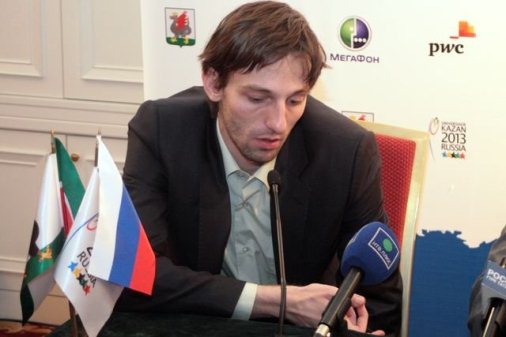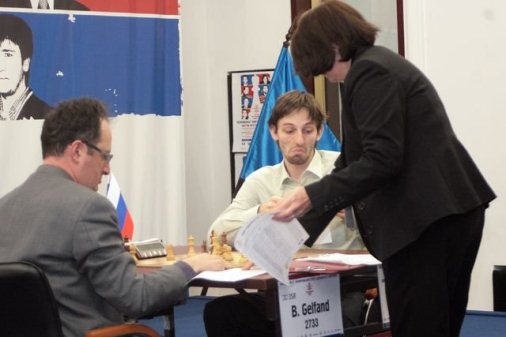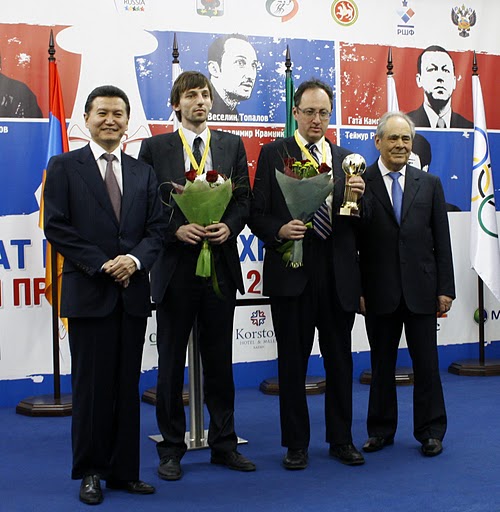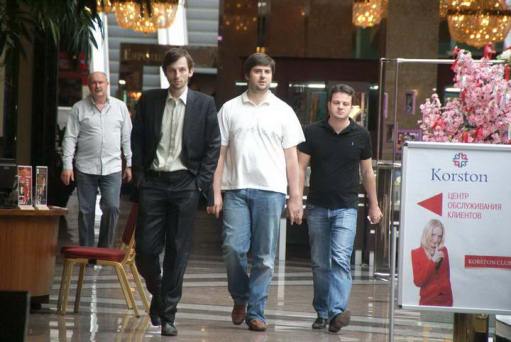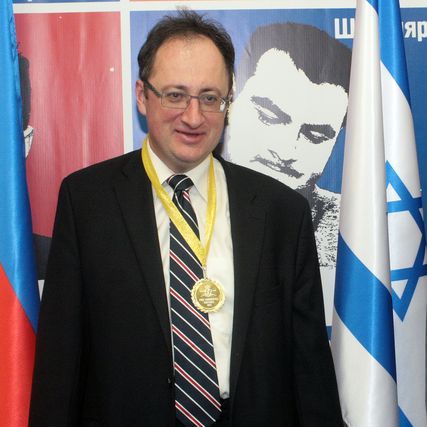
Boris Gelfand | photo: russiachess.org
After Boris Gelfand won the Candidates Matches in Kazan he gave numerous interviews that shed light on a player who, despite having been at the top of world chess for 20 years, is perhaps still something of a mystery to chess fans. It's time for that to change, as an Anand-Gelfand World Championship match awaits!
The text below is based on selected highlights from the following four interviews, conducted soon after Gelfand's victory in Kazan:
As well as talking about his path to victory, Gelfand discusses all kinds of topics, including the upcoming match with Anand, the "problem" of classical (and Russian) chess, the rating system, his career ups and downs, music… and the Champions League final. Due to the length it might be advisable not to try and read everything in one go, or at least to have a Shipovian cup of coffee © prepared!
Winning the Candidates Matches
Boris, could you sum up the Candidates Matches: how did your opponents surprise you? And which encounter was the most difficult?
In the quarterfinals Mamedyarov surprised me by completely changing his opening repertoire: he started playing 1. e4 and the sharpest Sicilians, and had prepared the Meran for Black. Both of those openings require an enormous amount of work. I think, however, his being out of training told. After all, his strength is based on wonderful practical qualities, but because he hadn't played for a long time Shakhriyar would sometimes sink into thought at the wrong moment, and was clearly nervous. The work he put in will have an effect in the long term, but it didn't work out in the first match.
Kamsky also turned out to be brilliantly prepared: he played the Najdorf very well and put an end to the Grunfeld. Of course, that was the toughest match. In the tie-break the situation was critical for me: I had to win on demand with Black. The rapid games were of a very low quality; that's the worst tie-break I've ever played.
I can't say Grischuk surprised me in any way, as you could just look at his two matches and see that he was very well prepared, as well as which openings he was using. The final match was tough, but it was clear what I could expect from my opponent. (RCF)
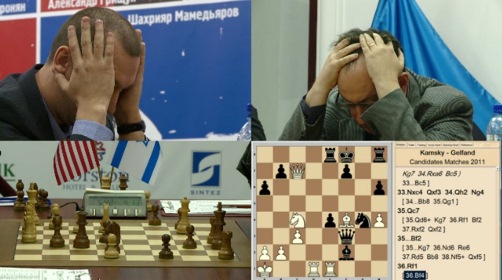
The battle against Gata Kamsky | photo: video.russiachess.org
You were a whisker away from being knocked out… (against Kamsky)
Yes, when I lost with White I really didn't have much chance. I got lucky that Kamsky made it a game. After all, he could have played 1. d4 2. Nf3 3. Bf4… He's played like that all his life. It would have been hard to win. Of course, anything can happen, but it's much harder than in a sharp Sicilian. When he chose the open Sicilian he gave me chances.
Madness on his part?
It's not madness. Everyone plays according to their internal instinct. He set himself a goal: to play chess. In the long run that's probably the correct decision. He lost here, but in the long run he might triumph.
What do you think – was your section of the draw easier than Grischuk's?
Yes, probably.
So it turns out that Grischuk cleared a path for you?
Well, I don't know who cleared a path for whom. We played the way it worked out. It wasn't me who thought up the draw. According to the previous rules I was supposed to play a match against Aronian immediately. The winner of the World Cup and the winner of the Grand Prix. Then they started to change everything: to include people, to link things together… I didn't get angry. If those are the rules – then ok, I'll prepare according to those rules as well.
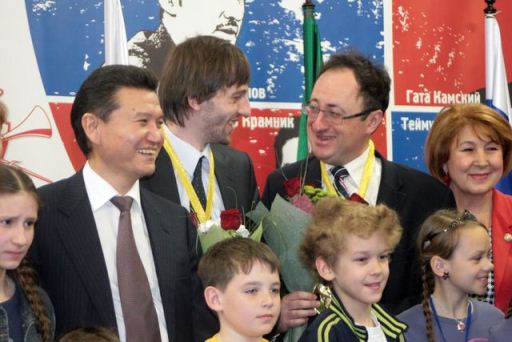
Friends at the closing ceremony | photo: russiachess.org
I noticed that you and Sasha Grischuk treated each other almost like family members. You called each other Borya and Sasha at the press conferences…
I've got a good relationship with everyone. I can't say it's any worse with Aronian or Kramnik. Sasha's been to my house, and I've been to his when I was in Odessa. He was playing in my city and I invited him round. It's pleasant to play an opponent you've got good relations with, and he congratulated me warmly. All three congratulated me warmly, but those warm relations didn't affect our play. On three occasions, figuratively speaking, he "had me on the ropes", in the 1st, 2nd and 5th games. I managed to hold on with only moves. The 2nd was really very tough.
In the 2nd Black probably should have attacked the d3-pawn, but he began pushing the a-pawn?
I still haven't checked it, but they say there was no "mathematical win" there. […]
Taking into account Sasha's experience in tie-breaks, were his chances greater?
In rapid chess, if you look at the results, then besides Anand no-one has done better than I have. All those World Cups played under the knockout system… I also beat Aronian in the same system in Leon. The chances were 50:50, as in the classical games. If players are of the same level then the chances are equal at any time control. I don't believe Sasha plays better in rapid than in classic. Sasha won Linares, the Russian Championship – he's won a lot.
And in blitz?
We'd also be even. That's blitz played after four rapid games, so who can be a favourite there?! Whoever's alive is the favourite. Whoever can handle his nerves better is the favourite. And I've played lots of blitz against Sasha. Both at my house and at tournaments.
An approximately even struggle?
In tournaments he's got an edge, but anything can happen: he might have won, or I might have won. Perhaps I'd have got a won position but then blundered a rook. And in the next game I might not blunder. In the World Championship Sasha won I was leading for the whole tournament. In the deciding game I lost to him, but I could have won if I'd taken the exchange at one point. If I'd won that game I might have become champion. He's a strong blitz player, but I don't think I'm so bad either. (ChessPro)
You didn't sleep at all, Boris? (after beating Grischuk)
It was very hard to get to sleep. It was much more difficult than after a painful loss. After a failure you collect yourself, analyse your blunders and think about how to eradicate them. But here – there was an incredible nervous exhilaration. When I won the World Cup in Khanty-Mansiysk in 2009 I didn't sleep a wink. Here I only fell asleep close to dawn.
Did you realise the magnitude of your victory?
I fully realised that the moment Grischuk resigned. I didn't require any time. Over the years I've learned to control my emotions. If they were controlling me then I'd never have won in Kazan. In the last game, after all, I realised that I was winning. But I needed to calmly apply the finishing touches to the job. Volodya Kramnik had just such an overwhelming advantage against Grischuk in the semifinals. If he'd taken his chance he'd have been in the final. But Kramnik, it seems, was let down by nerves. (SovSport)
The ratings system
With Boris Gelfand ranked 16th on the FIDE rating list before the Candidates (he's now up to 13th on the live lists), he was inevitably asked about the significance of ratings:
Boris, ahead of you is the first match in your career for the chess crown. How is it that you arrived at the Candidates Tournament with one of the lowest ratings among the participants, but left as the challenger for the World Championship title?
Ratings give an idea of strength, but don't show the relationship so precisely. The difference between the first and last participant wasn't so big. Everyone who travelled to Kazan had a chance of winning. I prepared hard for the tournament, for half a year together with my coaches and my whole team, and came to the matches in good form. Now I've got a very good feeling, but it's not going to be any easier to prepare for a match for the World Championship title. (RIA)
Has anyone calculated the rating points you added here?
Well, no-one was playing for ratings here… In general, I treat ratings with some irony.
Tell us what you think about it.
It's not a bad system – it shows your calibre and form. But no more. The fact that someone has 2770 now, while I've got 2730, doesn't mean I play worse. Well, he's played one tournament better, but in the next tournament perhaps I'll play better. You need to look at it as a whole. Let's say, four people have a higher rating, and then there are 10-15 who are more or less the same. And in about two years' time, if you take me, Grischuk, Ivanchuk and Nakamura, it'll be about the same. True, Nakamura has risen recently. The fact that today he has such-and-such a rating and I have such-and-such plays no role. It might be different tomorrow. (ChessPro)
Magnus Carlsen
Magnus Carlsen's withdrawal from the Candidates Matches cast a shadow over the event, and led to questions for Gelfand:
In the final your opponent was Alexander Grischuk, but it could easily have been Carlsen, whose place was taken by the Russian after Carlsen pulled out. What do you think was the reason for him not taking part?
It's only possible to speculate. I don't have any information. At the same time I can't understand his decision. It's a different generation, with different priorities, and perhaps different values, but I don't understand it. The reason he gave is illogical… But I don't even know what to say. (RIA)
I remember that in Wijk aan Zee you told me that Carlsen amazed you. You told me then that you thought he was a reincarnation of Karpov…
Yes, I remember that. Since then he's got much stronger. When I said that to you it was his first strong tournament. A couple of months before that I'd played him at the Tal Memorial and he was a clear outsider, he was playing at a different level.
Were you surprised that he refused to play for the World Championship?
It was a strange decision. Another problem is that the arguments he used weren't sound. Garry Kasparov was also surprised that he withdrew… There are a lot of versions. Everyone has to decide for himself what his values and priorities are. The cycle was changed because of him, as he pulled out of the Grand Prix but still got back in – the regulations were changed. It was strange. I'm not judging him. It's his choice.
The fact you played a match against Grischuk and not him – that was better for you, wasn't it?
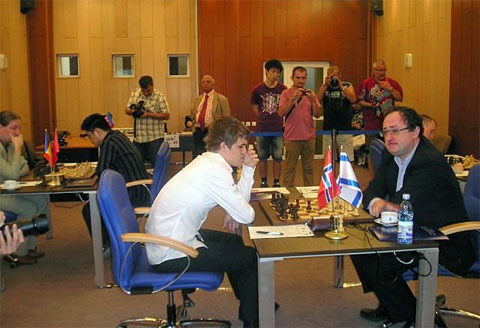
Carlsen - Gelfand in Bazna last year | photo: ChessBase
Perhaps it would have been easier against him. I've had an edge in our games. Last year I played him twice in Bazna and I had an advantage in those games. I'm not sure it would have been more difficult against him than against Grischuk. If someone's got into the eight and won two matches, then it can't be "easy". I don't think it would have been more difficult against Carlsen than the others. Perhaps it will be in future, but… (ChessPro)
The state of classical chess
Many people are talking at the moment about classical chess being close to ruin. That's why you end up with blitz and tie-breaks. There's a problem with classical chess.
The problem of classical chess… Alexander Grischuk said there are too many draws, that everything's simply been studied so much that it's harder and harder to win, harder and harder to surprise someone or to get complex play. Alexander said that after his games against Kramnik, who he was unable to pose any problems to for a long time. Of course, that's a little exaggerated. Yes, it's becoming harder than before, but not to such a degree. And the final match between Alexander and me showed that. You can pose problems, and our games were conducted in a very tense struggle. I was on the verge of losing on three occasions. Alexander was applying pressure, and it was only in two games out of six that we didn't manage to get a real struggle. That strikes me as a reasonable percentage.
And as for the winner sometimes being decided in games with a faster time control – that's a problem with classical chess, but there's no better option. Previously people would play until the first win – weeks, or months. But that's not realistic anymore. Each tournament has its format, its dates, and rooms reserved in hotels. No-one's going to book months in advance and then wait and see who plays. Everyone has plans, schedules and other tournaments. It's a reasonable compromise. If you have six games at a classical time control and the opponents are evenly-matched, then it's reasonable to decide the winner by playing a sensible number of games with a faster time control. Four games for deciding the strongest player is a reasonable number. At one time they'd play roulette to decide the winner, but you'll agree it's more logical to play blitz than roulette. Of course, it's not an ideal formula, but it is a normal one. Nothing's perfect in this world. (RIA)
Here's a typical situation: the next round is starting, and journalists (myself included) and also your assistants, go off to have lunch. At concerts, when the conductor raises his baton, no-one rushes to the buffet!
True, everything has its own peculiarities and it's hard to compare. It strikes me that the main niche for chess now is the internet; the longer a game lasts, the more people watch it. There are more visitors to sites, traffic and so on. There are a lot of advantages and I don't understand these discussions about how much of a spectacle it is. It strikes me that we've got a sensible balance between rapid and classical chess at the moment. Each organiser runs what suits him more. I've got a very good opinion of classical chess, and rapid, and blitz, but I don't like a mix. Danailov takes away half an hour – for some reason there's 1 hour 30 minutes for 40 moves. Or FIDE tries to take away some time. It makes no sense, as after all it's not going to be rapid but the quality of the games will be lower. The constant desire to reduce the quality of games is incomprehensible to me. It's a kind of obsession: let's organise time trouble, the grandmasters will start to blunder, and it'll be more of a spectacle for people! That's what I'm against. But if rapid chess tournaments are run that's great – it's spectacular, vivid, and it'll attract a lot of additional spectators.
But nevertheless: we're sitting having lunch while on the stage the grandmasters are meditating for around 40 minutes. Do you need such meditations? Wouldn't it be possible to get by without them and simply use time rationally? Then there wouldn't be time trouble blunders and the quality of the games wouldn't fall too much?
Perhaps, but in the last game of the final I thought for about 40 minutes over the move 18. Nh4 with the idea of f2-f4, which was highly rated by my opponent and many very strong grandmasters. If I'd had to make the move in 5 or 10 minutes I either wouldn't have found it, or I wouldn't have believed it. I needed time. If you want to get high-quality games you need to allow time. (RCF)
The World Championship match against Vishy Anand
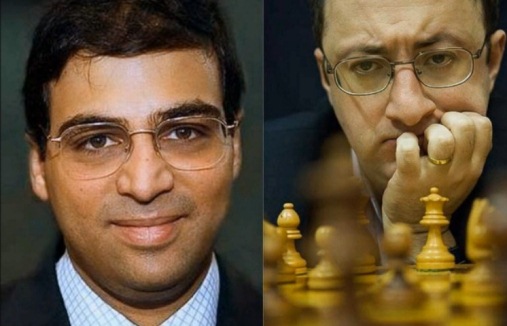
I know it's still early to talk about it, but what might be the deciding factor in the match against Anand?
Who's better prepared. Moreover, we're both older players, so who has the most energy. He's got great experience of similar matches, which is also a significant factor. Therefore it's simple – who's in better form, who, perhaps, gets lucky – that's who'll win. Sport is sport. And in terms of age it's very symbolic: they say that the young are making their presence felt, that there's generation chance, but it turns out that the World Championship will be played by chess players who've already been playing for 20 years. That's a good sign and a signal to the young that if they don't achieve success in a year or two life isn't over, that you have to keep fighting and success might come at any moment.
So far there's been no word on the place or date of the title match – are those crucial questions? How much time do you need for preparation and how important are those questions for you overall?
FIDE is taking bids until the 30th June, so we should find out quite soon. The official dates are April-May 2012, but rumours suggest it might be delayed a little, to the summer. So there should in any case be enough time for preparation – a year. There's no problem with that. While as for the location, the main thing is to play in a normal climate. That's fundamental. On home soil or not? At home it's fine, but there's also more pressure. In India – for Anand, in Israel – for me. Therefore the main thing is that the weather is sunny. But overall, that's not a crucial question, more so as in spring and summer it's good weather almost everywhere. It's simply pleasant to play when the sun's shining – you've got a completely different mood. (RIA)
If playing in Elista's suggested, will you play there?
And what's wrong with Elista? Candidates Matches were played in Elista and the organisers tried very hard. The objective conditions were tough: it was hot. But if they say Elista – then we'll play in Elista. There are people who get paid to be responsible for handling it, so let them earn that.
The size of the prize fund is a fundamental question for you?
Well, there should be some sort of minimum…
A million dollars appears to be the minimum.
I don't know. I've never followed it. Whatever's written in the rules, that's what it should be. That's why rules are written, and not to be changed every five minutes. If more's on offer somewhere, then go for that. But it shouldn't be any less than the established minimum. (ChessPro)
Fitness regime!
On the Chesspro forum there's been a slightly strange discussion about your physical condition. People have been saying that on photographs it's noticeable you've got a "tummy". And our aesthetes would like to see you slender and toned, like Grischuk, for example. How do you yourself relate to your "tummy"?
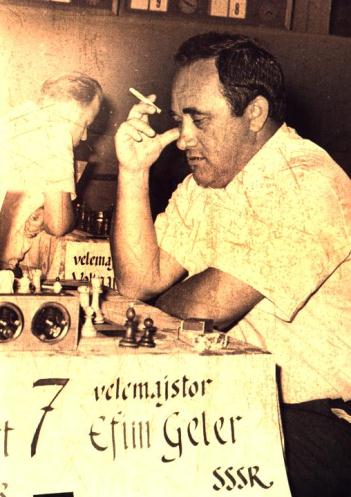
Efim Geller's fitness regime
Calmly. I weighed myself today: during the tournament I lost five kilograms. I had a discussion with Anand. He said that without going to the gym it was impossible to maintain your form. But I say: it's possible. We'll see.
I always remember Efim Petrovich Geller. He was quite a plump man and I don't think he went to the gym. But Korchnoi, in one of his interviews, said that Efim Petrovich was one of the most energetic chess players. And aged 54 in Minsk, at that Championship you were at, Efim Petrovich played brilliantly and became USSR Champion.
Tigran Vartanovich Petrosian. He didn't go to the gym and also had a "tummy". But he played so energetically! It strikes me that the basis of success is a healthy way of life. You need to walk a lot. To eat well. (ChessPro)
First steps in chess
Where did your acquaintance with chess start?
There's a wonderful children's textbook, probably the best in history – "Journey to the Chess Kingdom". My dad, who really loved the game, began to go through a diagram a day with me. One evening I told him that I wanted to study something else. Well, he thought the boy had cooled towards the chessboard and pieces. He told my mum that chess hadn't interested Boris. My dad couldn't even imagine that I'd gulped down the whole book in one day and therefore wanted something new. Unfortunately my father didn't live to see my victory. We lost him one and a half years ago…
Did you soon realise that you'd become a professional chess player?
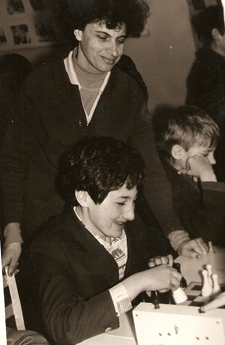
Tamara Golovey with a young Boris Gelfand | photo: wichitachessclub.org
After school my parents insisted I received a professional education. But when I started to get into the semifinals of the USSR Championship, which was considered a great success back then, they left me alone. I enrolled in Physical Culture at university, so as to avoid the army, and gave myself up to chess completely. By the way, they still dragged me into the military for ten days – the most unpleasant memories of my life.
What did you feel when you found yourself in the company of great grandmasters?
I'll tell you a story. 25 years ago I was playing a game in a tournament against Alexander Khalifman, now an ex-FIDE World Champion and one of the commentators on my match against Grischuk in Kazan. The tournament took place in my native Minsk. My position wasn't very good. I was terribly nervous as I was a young master, and the elite were there. Suddenly two well-known grandmasters came up to us – I won't give their names – and started to watch me carefully. I tried to make myself small, thinking it was embarrassing, I was losing, I'd make a fool of myself and they'd laugh… I made a move and got up from the board. They approached me and delicately asked: "Borya, you're a local here. Do you know who that elegant blonde sitting in the fifth row is? Introduce us!" (SovSport)
Chess career
The chess journalist Yury Vasiliev first met Boris Gelfand at the USSR Championship in Minsk in 1979, and has followed his career ever since. He even mentioned laughing with Tigran Petrosian about Gelfand's habit of spinning a chess piece in his hand while thinking – back in 1980!
You know, Boris, when speaking to you I can't get rid of a strange feeling, like déjà vu. As if you've been around forever.
Yes! I've been around forever since 1979!
And it's as if you haven't really changed…
And you haven't changed either! I remember you perfectly!
What I'm getting at, Borya, is that now chess has got younger and people become grandmasters at 14… But suddenly you've qualified for a match against the champion… And you'll be older than him! It's amazing! After all, you were always a candidate for that match, you were always among the few…
I've always played well in the candidates events, but none were held for ten years.
Maybe your time has finally come, Borya?
I don't know… I've kept working, I enjoy the game… It's a very interesting business, playing chess! And I also think there's a lot of exaggerated talk about youth. I've played 20 games against Kasparov, around 50 games against Karpov, 20 with Korchnoi, 80 with Ivanchuk (including 50 in classical chess), 30 with Anand and 30 with Kramnik. No-one else has such experience. Only Ivanchuk and Anand. Well, and perhaps also Kramnik and Topalov.
I remember in Las Palmas asking Anand if he could name the top-10 chess players of all time and nations. He said straight away: "Or maybe 5?" Could you name your top 5 or 10?
No, I can't. They're all great. Both those who became champions, and those who didn't.
After all, you really loved the games of Akiba Rubinstein…
I knew them all by heart, from Razuvaev and Murakhvery's "60 games". I came home from school, sat on the couch and read it without a board, game after game… I knew all sixty by heart. (ChessPro)
In the early 90s you were considered a realistic challenger for the crown, your achievements were growing, and then a certain decline began. Why?
It's hard to say. It was necessary to rethink some things, to reconsider. And to a degree it happened artificially. In 1997 I played badly, but at the end of the year, in the first FIDE knockout championship, I got to the semifinals in Groningen. True, I mainly won in tie-breaks, and at the time that was considered bad form and I got a simply amazing hounding from the press! If someone wins a tie-break now you say well done, but back then I got such a hounding and they stopped inviting me to tournaments. There were also objective circumstances: 14 people used to play in Linares, but they reduced that to 7, and there simply weren't many tournaments, while new chess players were coming along. At some point I stagnated; I was working, but I wasn't thinking about exactly how I had to work. (RCF)
Soviet and Russian chess
Do you know that Russian fans took just as much pleasure in your victory as Israelis, as many people still consider you one of our grandmasters?
Of course I represent Israel and I'm proud to play for my country and bring victory to my country. Yes, I was born in Minsk and I lived the majority of my life there. I was formed as a chess player there and I've played dozens of times in Russia, very successfully. I've got a lot of friends, a lot of fans who keep supporting me – therefore it's no surprise that my victory was received like that in Russia. And of course in Kazan I felt as though I was at home. Even my opponents complained about it. (Translator's note: one example is this interview I translated with Gata Kamsky). In no match, including the final against Alexander Grischuk, did I feel as if I was playing on foreign ground. The fans' support was very important and I want to say a big thank you to them.
I came across the surprising opinion that Russian chess has seen a very serious decline, that the last time a Russian held the chess crown was in 2007, and that now the World Championship will take place without any Russian grandmasters. What's your opinion on that?
I categorically disagree. It seems to me that the situation in Russian chess is the best in the world. No other federation works as effectively as the Russian one. Over the course of many years the best round-robin tournament in the world has been run in Moscow – the Tal Memorial, as well as the best open tournament – Aeroflot Open. It has the strongest national championship, a series of very important tournaments and the Russian team often wins. There's no decline at all.
The problem is the appearance of very strong competition. In the past there was no competition, but now there are lots of chess players in many countries around the world. At the moment there are two Russians in the top-8, and another two nearby – Karjakin and Svidler. Russian chess is on the rise and there's no doubt everything's ok. No other country in the world has such a quantity of chess players of the very highest class. It's simply that in the past other countries didn't have such a quantity of good chess players.
As for the World Championship title… Yes, Kramnik lost to Anand in the match in 2008, but that was played between the best players in the world, and one of them had to lose. That doesn't signify any sort of crisis. A genius was born in India. It happens. I'd be happy if we had the same situation in Israeli chess as there is in Russia. Even if it was ten times worse than in Russia that would already make me happy. It's simply that everyone's got used to the fact there's a Russian champion. But the world's changed.
In Soviet times, apart for the USSR, a series of countries in Eastern Europe and, perhaps, Holland, chess wasn't so developed, there were no tournaments and essentially there was nothing. But now the world has opened up. Previously, after all, no-one, with rare exceptions, saw the games from serious tournaments, while now you can follow any game live – even national events among boys and girls. All the games are freely available. Before, if you were born, like Anand for example, in India, only enormous talent and a great capacity for work could help you to reach the summit.
But now the situation's changed. People get to know about chess players in the most far-away countries, they're invited, and everyone is on a level footing. Therefore talents also appear in countries when it would previously have been unimaginable, and where, perhaps, they didn't know what chess was. Norway, the Philippines, Vietnam.
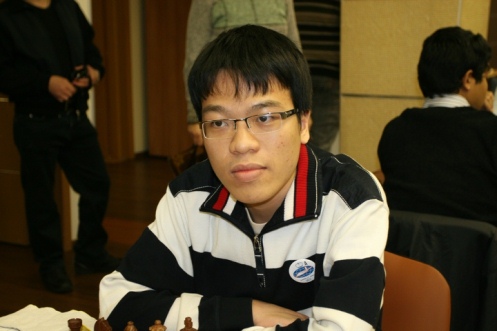
Le Quang Liem, Aeroflot winner in 2009 and 2010 | photo: Chess-News.ru
A boy from Vietnam has won the Aeroflot Open for two years in a row – and that's the world's strongest open tournament. That really indicates something. Russian coaches travelling abroad for work are also bringing results. Now there's interest, sponsors, and everyone can invite the best coaches, specialists and assistants. And after all, it's become fairer: if you weren't born in a chess country but you've got the desire and talent – you've got more possibilities than before. (RIA)
Do you agree when people call you "a student of the Soviet School of Chess"?
If you add the essential "detail": the Minsk School of Chess. That started with Boleslavsky, then passed through Kapengut to me, and other chess players living under the influence of Boleslavsky's ideas. In Minsk they always played the most principled opening variations. In Riga, let's say, they played in the style of Tal, in the Caucasus – in the style of Tigran Vartanovich [Petrosian]: offbeat systems, based on subtleties… In Lvov it all derived from Stein. In Belarus everyone played the Sicilian, the King's Indian… And always the most challenging systems. (ChessPro)
Family life
How are things in your private life?
Everything's good. There's been an addition to our family: our son was born.
How old is he?
Two months. I've barely seen him: I've been here all the time.
What's he called?
Avner.
And what does that mean in Hebrew?
"My father – light".
And you told me that your daughter's called Avital. That means "morning dew" – yes?
Yes. My wife's called Maia.
Did she call you in Kazan?
Every day. On Skype, of course. Avital kept asking, "Daddy, haven't you finally won yet?!" I told her, "Not yet". She said, "But you've got three helpers! Why aren't they able to help you?!" I said, "They're helping. We're working". She said, "Well, you'll at least come back by my birthday?" That's in September. I told her, "I'll be back before then". (ChessPro)
What's she like at chess?
There was a slightly unpleasant incident. In our city they teach chess at 30% of the kindergartens, including hers. Her teacher phoned me and said: "What's going on? Why does your daughter refuse to play chess?" After that we bought her animated computer programs and she did take an interest, but not a great interest and she's got other hobbies. She does play, though. (RCF)
Other interests
Do you like music?
Yes. Classical. I also like rock.
Can you say you like listening to Brahms or, say, Hayden, or Bach's Brandenburg Concertos…
No, I'm not at that level. It's more that I like the atmosphere of concerts. When I go to a concert I understand that something great is taking place. People wrote the music centuries ago, and you can't write anything better. That paradox occupies me. I constantly think about it. In some spheres development has gone as far as it could, and in music what's been written in the twentieth century is the low point.
Do you agree that music directly affects your soul?
Perhaps… Perhaps…
Kramnik and I once discussed the topic. He's friends with musicians and Volodya told me that chess reminds him of music.
It also seems like that to me. I talked to Nikolai Lugansky and realised that the professions are similar. Well, a little different, of course. In chess you should get yourself into a particular state of mind, and also take into account your opponent's state of mind. But in music, it's only yourself. It seems to me that chess should position itself as an occupation for intelligent, educated, thinking people. A person has to make an effort to understand chess. You don't need to reduce chess to a level where it'll be comprehensible to people who aren't interested in it. And to have more people interested in it you need education. It seems to me there should be a scheme like that – you need to draw people into chess in childhood. (ChessPro)
Do you have an aptitude for languages? Have you learned Hebrew?
At an everyday level; I speak badly, but I can talk when necessary. I once gave an hour-long interview – that's my greatest achievement in Hebrew.
Do you find languages difficult or is it simply that it's not necessary?
It might be necessary, but not to such a degree as to make the extra effort. If it's a question of whether to look for ideas in the Grunfeld Defence or to polish my Hebrew, then the answer's unequivocal: the Grunfeld Defence comes first! (RCF)
Future plans
Borya, the traditional "journalistic" question: what are your immediate plans? Where are you going to play?
I'm going to rest. Rest for a loooong time. This summer I probably won't play anywhere. I need to recover.
If they invite you to Bilbao will you play?
If they invite me I'll think about it. It's a very strong tournament. But for now I haven't been invited.
Well, they might now.
Perhaps. (ChessPro)
In August the World Cup is taking place. Are you going to play there?
I don't know yet. If I hadn't won in Kazan I'd definitely have taken part, but as it is, probably not. (RCF)
And finally… Barça!
For anyone who doesn't follow football, on Saturday Barcelona brilliantly beat Manchester United 3:1 in the Champions League final (the main club event in Europe).
I know you're a fan of Barcelona…
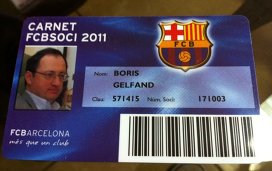
Gelfand's supporter's card | photo: Vasily Konov, rian.ru
I really love football and played myself at an amateur level. When I first saw the Holland team at the European Championship in 1988 it seemed as though there were Gods on the pitch. What players they were – Van Basten, Gullit, Rijkaard, Ronald Koeman! And in 1994 Barcelona made the same impression on me. Do you remember Stoichkov, that same Koeman, Romario? Since then it's as if I've drunk a love potion.
Are you flying to London for the Champions League final?
Yes, my friends gave me tickets as a gift.
Have you got their scarf with you?
I'll buy it there. You know, our whole family supports Barça now. My young daughter sings the club's song along with me. She's learned it by heart. I gave her a plastic water bottle with the team logo. In kindergarten her friends teased her about it, saying a girl shouldn't be a football fan. She made fists at them and shouted: I supported, support and will support Barcelona! And then she sang the song. After that they left her alone.
I know you're even part of the official fan club.
Yes, that was a present from my wife on my birthday. (SovSport)
Zangalis asked Gelfand to provide a commentary on his match against Grischuk as if it had been the Champions League final (!).
Of course I'll be Barça, and Sasha Grischuk will be the English club. The game was balanced, when suddenly the English team launched a sharp counterattack, but Mascherano and Piqué put out the fire in front of their goalmouth (the first game). There was another goal-mouth incident: Rooney hit a powerful shot at almost point-blank range, but Puyol cleared the ball off the goal-line (the second game). Phew, we'd escaped. Half-time.
The second half begins. Neither team decides to go for an all-out attack. They continue to probe each other (the third and fourth games). Then Manchester are once more on the attack, Valdés, a Barça defender, makes a mistake in front of his own goal, but Busquets and Mascherano again repel the threat (the fifth game). There's a bold attack by the Catalans. Messi beats one defender after another, gets into a one-on-one situation, waits for Van der Saar to go to ground, and scores the winning goal in the 89th minute (the sixth game). Barcelona are the best team in Europe again! (SovSport)
Perhaps it's fitting to end with this final "football" comment from Gelfand:
I look at you now and see a completely happy man…
That's how it is. What else do you need? My son's been born, I'm going to play a World Championship match, tomorrow I'm flying to the Champions League final… Although, to be completely happy, I still need Barça to win. (SovSport)
You can watch Boris Gelfand being greeted on his return to Israel in this report by the Russian-language 7kanal.com. He's met by representatives of the Israeli Chess Federation, one of whom says in a short interview that it would be the dream of all Israeli grandmasters to organise a World Championship match in Israel, and they'll never have a better chance. That said, neither Gelfand nor the federation seem confident of any government support. The 7kanal report notes that no representatives of the Prime Minister's Office or the Ministry of Sport were present in Ben Gurion International Airport, despite being invited.
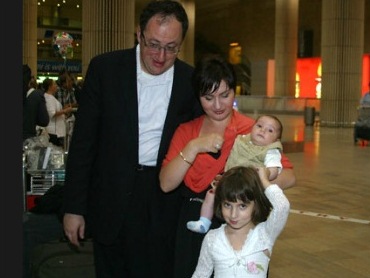
Gelfand was met in the airport by his family | photo: 7kanal.com
That probably didn't concern Boris Gelfand too much, though, as he was also welcomed by his wife and children, with Avital being the first to jump into his arms!






























